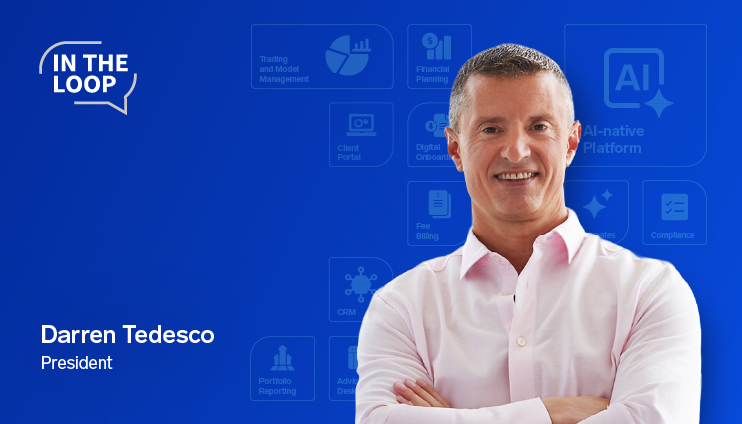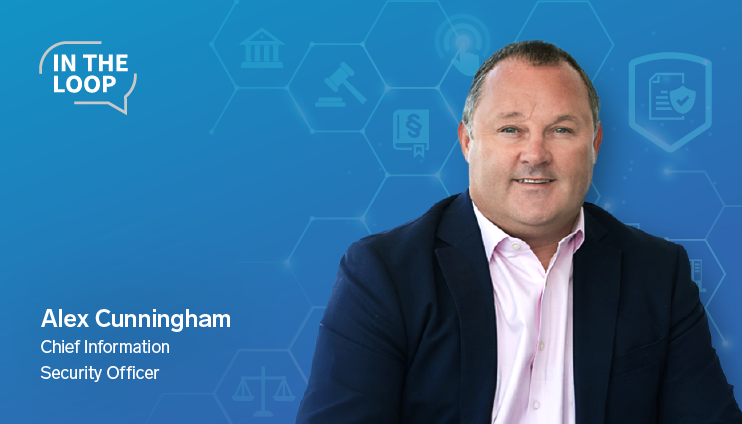From Buzzwords to Business Impact: Insights From FSI OneVoice 2026
At FSI OneVoice this year, the most interesting conversations weren’t about any single product or announcement—they were about how fundamentally the...
Solve your current pain points with our award-winning solutions.
Increase automation with our modern wealth platform.
The leading end-to-end wealth management platform.
Our team works to anticipate and surpass our clients’ expectations.
Merge our open, integrated platform and its solutions into your tech stack.
The #1 reason advisors switch firms is the desire for better technology.
3 min read
 Darren Tedesco
:
11/2/23 10:27 AM
Darren Tedesco
:
11/2/23 10:27 AM

Advisors are both excited and overwhelmed by news and insights on artificial intelligence (AI). It feels a lot like the front-end of a hype cycle, with so many up-and-coming tools promising streamlined results that will boost an advisory practice’s bandwidth while making the client experience smoother. Parsing the signal from the noise is a challenge. Moreover, finding the time to try, let alone implement, innovative technology is a tall task.
It’s tough to gauge exactly how AI will be leveraged within wealth management in the coming years. What we do know is that AI/machine learning gets smarter over time. But there’s a caveat—continuous improvement is subject to the age-old idea, GIGO…Garbage In, Garbage Out, regarding the quality of data generated. At the end of the day, AI and data quality go hand in hand; AI-generated insights are only as reliable as the data they’re drawn from.
Here’s where Advisor360° improves the process and creates meaningful value. Our Unified Data Fabric® (UDF) creates clean, consistent, and comprehensive data sets that leverage the capabilities of AI and machine learning to deliver business insights. The last thing a busy advisor wants to do is compare competing data from multiple sources to determine what’s correct. Our solution integrates hundreds of data feeds and internal platform data across a wide and deep suite of capabilities into a cohesive whole, ensuring that data is accurate, consistent, and readily available throughout the platform.
Holistic data also requires a human touch. Our expert teams identify and address data issues in real time to ensure accuracy and reliability. With years of experience building high-performing platforms, we’re leveraging AI as the natural next step to enable outcome-oriented workflows that boost efficiency.
The over-arching use case of AI is to free up people to focus on higher value activities. Data quality is paramount within that endeavor. In fact, if the data underlying AI is unreliable, the software itself is inherently flawed, making automated workflows less effective.
Financial advisors interact with all sorts of software and data sources, ideally automating routine workflows so advisors can spend more time with clients and building their business. The right AI system streamlines processes, performs operational tasks, and reduces errors. The challenge for wealth management firms is to find the right system—Advisor360° is on the leading edge of such innovations.
Our product managers and data scientists are focused on determining how workflows carry through and across capabilities. Taking it a step further, bridging gaps between AI and how advisors interact with such platforms is critical to creating real value. Those familiar with the state of today’s FinTech products and tech stack solutions recognize that the focus is shifting from AI merely providing recommendations (the “Next Best Action”) to AI proactively executing tasks (the “Next Action Taken”).
While “next best action” is a term frequently tossed around, this is really yesterday’s AI. True innovation rests with systems that have the ability to not only provide suggestions (and advice), but also perform administrative tasks on behalf of the advisor, introducing greater scalability and efficiency.
Digital assistants epitomize this AI and data quality transformation. Alerts and notifications of what action should be performed next and by whom—a.k.a. “Next Best Actions”—are great for smaller data sets. But what happens when there are hundreds or even thousands of next best actions? At some point, alerts, notifications, and task assignments lose their scalability. Enter, ViDA®.
We are developing our next-gen virtual digital assistant, ViDA, with a focus on finance, workflows, and human behavior relative to the wealth management industry. ViDA is being designed to not only suggest next best actions but to also act on an advisor’s or client’s behalf and send an alert so they know what actions have been taken. Like most innovative technologies, lower-risk activities come first. Take Tesla for example; its auto-driving capability was not the default in all cars initially because the software needed time to “train” in the real world (and even now, some debate remains as to whether the machine or the human is the safer driver).
AI technologies will require more human oversight initially. For example, an advisor is unlikely to use ChatGPT or Bard to write a client newsletter and send it out without close review. ViDA will work the same way. Initial alerts and action suggestions can be “graduated” by the home office or advisor to taking the next steps automatically once the technology is proven to be valuable, consistent, and accurate.
A few examples of the automated workflows Advisor360° is developing:
There’s enough AI firepower out there, but it is all for naught without a foundation of quality, holistic data. Yes, machine learning can help make flawed data better over time, but why start from a position of weakness rather than a position of strength? So next time you hear the term AI, think about the company’s underlying data, and if it’s clean, consistent, and comprehensive. If the answer is no, then it’s not really AI, it’s just A.
Darren Tedesco is President of Advisor360° and has been part of our software development since its inception, bringing together the thinkers, creators, and visionaries that help power our clients’ productivity, profitability, and growth.

At FSI OneVoice this year, the most interesting conversations weren’t about any single product or announcement—they were about how fundamentally the...

AI has already proven it can make advisors more efficient. The next phase of adoption will be defined by something equally important: trust.

The rationale for AI governance in fintech firms and how Advisor360°TM approaches roles, responsibilities, and enablement.